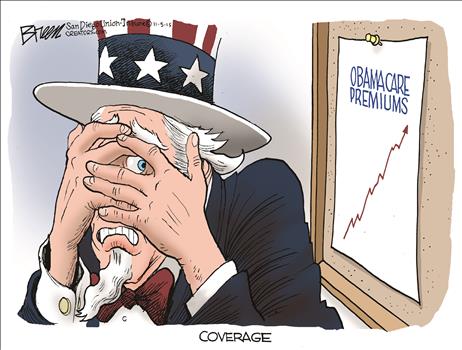– Largest U.S. Health Insurer Is Done With Obamacare: UnitedHealth To Exit Most State Exchanges:
As conclusion to our article yesterday reporting on the largest U.S. health insurer’s accelerating exodus from various Obamacare markets (it had already announced it was out of Georgie, Arkansas, Michigan and Oklahoma) we said that UnitedHealth “will likely announce more defections in the coming days.”
We didn’t have long to wait, and moments ago Bloomberg reported that in addition to the four states listed above, UnitedHealth has just announced it is departing the following “Affordable” Care Act state exchanges: Connecticut, North Carolina; Nebraska, Pennsylvania and Texas.
That, too, however, is just a preview of what’s to come, because earlier today UnitedHealth made its divorce with Obamacare complete when it announed plans to exit most of the Affordable Care Act state exchanges where it currently operates by 2017.
During a conference call with analysts Tuesday, CEO Stephen Hemsley noted that “next year we will remain in only a handful of states.”
As CNN reports, CEO Stephen Hemsley explained that UnitedHealth will leave most states by 2017 because the markets for these exchanges are relatively small and also have higher risks for the company over the short-term. As such, he said UnitedHealth (UNH) could not serve these exchanges on an “effective and sustained basis.”
Said otherwise, the company is losing money by participating in Obamacare.
UnitedHealth’s president and chief financial officer David Wichmann added that the company served 795,000 people on public exchanges as of the end of the first quarter. It expects to have only 650,000 public exchange members by December.
As CNN politely notes, “this could be a blow to President Obama and his signature law to overhaul the nation’s healthcare system.”
More importantly, it could be a blow to taxpayers because as we observed yesterday, according to estimates from the Kaiser Family Foundation, the exodus will almost surely mean higher insurance premiums in several states – most notably Alabama, Arizona, Iowa, Nebraska and North Carolina. It will also mean even higher subsidies.
Still, some remain optimistic: Cynthia Cox, associate director of health reform and private insurance at Kaiser, said this won’t be the death of Obamacare. She noted that UnitedHealth has been more cautious about entering the ACA markets than its competitors. Hemsley had warned previously that claims tied to the Obamacare exchanges were costlier than expected. And other insurers that focus on Medicaid and Medicare pans, such as Centene (CNC), are more prominent players in the state exchanges.
Perhaps it’s not the end for Obamacare, but it means even greater sticker shock for Americans once they get their premiums for 2017. Recall that as a result of the merger between Aetna and Humana, and that of Cigna and Anthem, the industry is about to shrink from five players to only three.
This means much higher premiums.
It also means that mandatory Obamacare tax payments will keep “healthcare” spending as the biggest contributor to US GDP for years to come.
* * *
PayPal: Donate in USD
PayPal: Donate in EUR
PayPal: Donate in GBP

